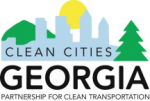Southeast Regional EV Readiness Planning Program
Awarded:
Completion Date:
Project
The Southeast Regional EV Readiness Planning Program forecasted the demand for EVs and the distribution of charging infrastructure in the tri-state region (Georgia, Alabama, and South Carolina), as well as assessed the potential impact of EVs on the electrical grid. The project team conducted workshops on the local, state, and regional level to create an understanding of the barriers to EV deployment and develop solutions. The program consisted of the development and distribution of a comprehensive workbook to assist communities with EV readiness and to educate stakeholders on their role in supporting EV readiness. Upon completion of the workshops and workbook, the project team organized three conferences in each of the states within the tri-state region to promote EV readiness and introduce the workbook. Lastly, the project team worked with several communities in the tri-state region to assess their level of EV Readiness using the Plug-In Electric Vehicle Community Readiness Scorecard developed by DOE’s Clean Cities Initiative.
EV Readiness Workbook
EV Readiness is a collection of strategies, policies, and actions that empower a community to support the deployment of plug-in electric vehicles and charging infrastructure, and, as a result, derive the associated benefits. The purpose of this workbook is to introduce the concept of EV Readiness to community stakeholders in the Southeast—and in particular, in the Tri-State region of Alabama, Georgia, and South Carolina. The workbook provides resources and tools to enable a community to become EV Ready. “EV Readiness” requires the adoption of a number of strategies and policies from a variety of stakeholders to support the deployment of electric vehicles and charging infrastructure.
Download the EV Readiness Workbook:
- Section I introduces the concept of EV Readiness from both a national perspective as well for communities in the Southeast
- Section II includes an in-depth examination of the roles of various stakeholders, including government, fleet managers, and property managers/employers.
- Section III provides a number of resources for stakeholders to support their efforts to help their community become EV Ready.
- Section IV introduces the Plug-In Electric Vehicle Readiness Scorecard. The U.S. Department of Energy developed the scorecard as a tool to help a community assess their readiness for plug-in electric vehicles and the infrastructure needed to support the vehicles. With the help of the scorecard, a community can elevate its EV Readiness, receive feedback on its strengths and areas in which they can improve, and record and track their progress towards EV Readiness.
